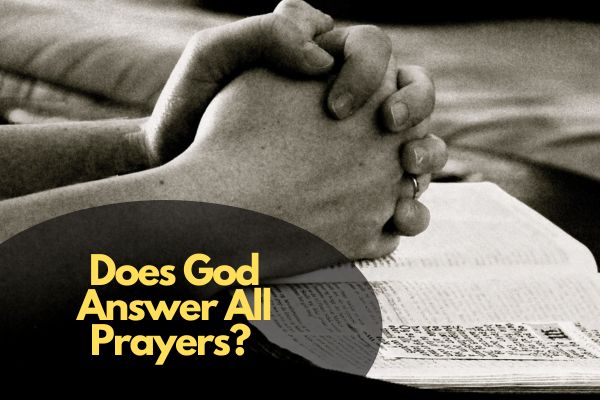Prayer is a fundamental aspect of religious and spiritual practices across various cultures and belief systems. It serves as a means of communication with a higher power or divine entity. Many people turn to prayer to seek guidance, express gratitude, and ask for blessings or forgiveness. However, the question “Does God Answer All Prayers?” is a complex and multifaceted one.
In this article, we will explore different perspectives on prayer and look into seven ways in which God may respond to our prayers.
Does God Answer All Prayers?
The question of whether God answers all prayers has resonated with humanity for millennia. It’s a question born of both deep faith and profound doubt, a reflection of our yearning for connection and our struggle to understand the divine.
On one hand, countless religious texts and personal testimonies tell stories of prayers answered, wishes granted, and lives transformed through divine intervention. From the parting of the Red Sea to the healing of the sick, these narratives offer powerful evidence of a higher power listening and responding to our pleas.
On the other hand, the world is filled with suffering, tragedy, and unanswered prayers. Why, if God is truly loving and omnipotent, would He allow pain and hardship to persist? If He truly hears our cries, why do so many prayers seem to go unanswered?
These are questions that have no easy answers. They grapple with the very nature of faith, the limits of human understanding, and the complex history of free will and divine providence.
Different Theological Perspectives
Different religious traditions offer varying perspectives on the nature of prayer and God’s response to it.
- Abrahamic religions: Judaism, Christianity, and Islam all emphasize the importance of prayer as a form of communication with God. These traditions also acknowledge that God’s answers may not always be what we want or expect.
- Eastern religions: Hinduism, Buddhism, and Taoism often view prayer as a way to align oneself with the divine will or achieve spiritual enlightenment. In these traditions, the focus is less on petitionary prayer and more on inner transformation.
Understanding Unanswered Prayers
There are many reasons why prayers may seem unanswered. Some possible explanations include:
- Our prayers may not be in alignment with God’s will. God’s wisdom and perspective are far greater than our own, and what we desire may not ultimately be in our best interest.
- Our faith may be wavering. True faith requires trust and surrender, even when things are difficult. If our faith is weak, our prayers may not be heard or answered.
- God may be calling us to grow through our struggles. Sometimes, unanswered prayers can be opportunities for learning, personal growth, and deepening our faith.
Ultimately, the question of whether God answers all prayers is a personal one. There is no right or wrong answer, and each individual must come to their understanding based on their faith, experiences, and beliefs.
Finding Meaning and Comfort
Regardless of whether our prayers are answered in the way we hope, there is still comfort and meaning to be found in the act of prayer itself. Prayer can be a source of strength, hope, and peace. It can connect us to something larger than ourselves and offer a sense of purpose and direction.
So, while the question of whether God answers all prayers may remain unanswered, the act of prayer itself can be a powerful and transformative experience. It can bring us closer to the divine, deepen our faith, and help us find solace and strength in the face of life’s challenges.
Conclusion
In conclusion, the question of whether God answers all prayers remains a complex and deeply subjective aspect of faith. While diverse theological perspectives and personal beliefs shape responses, the essence lies in the profound and nuanced nature of divine interaction.
Whether perceived as a direct response, an alternate plan, or an opportunity for personal growth, the inquiry prompts contemplation on the intricate relationship between human supplication and divine providence.
Regardless of differing interpretations, the exploration highlights the profound and mysterious dimensions of faith, reminding believers of the diverse ways in which prayers may be acknowledged within spiritual understanding.






